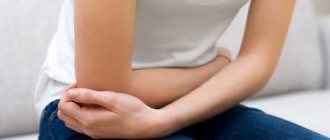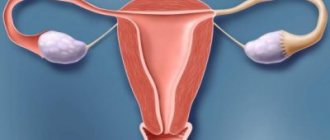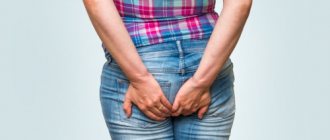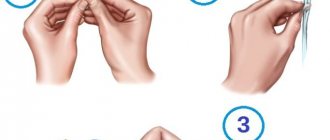During menstruation, a woman may experience pain in the anus. Spasms of the anal muscles occur not only during the act of defecation, but also at rest. This pathology can be caused either by physiological processes or by some disease. If you do not pay attention to the pain, it will soon spread to the inner thighs, tailbone, or even the gluteal muscles.
The anus has many vessels and nerve endings. This is dangerous because due to unfavorable factors and inflammatory processes, nodes form inside the intestine. When blood flow increases during menstruation, the anus is subject to active proliferation of pathogenic microorganisms located in it.
It can also be caused by a sedentary lifestyle, heavy lifting and intense physical activity. These factors can cause pain in the intestines. It is necessary to understand the reasons in more detail:
Intestinal diseases
Anatomically, the vagina is located very close to the rectum. They are separated only by a small partition. Therefore, all women experience discomfort in the anus during menstruation. But the nature and duration of the pain plays an important role: if it is cramping, sharp and does not go away for several days, then this is a reason to visit a doctor.
Haemorrhoids
During menstruation, blood flow to hemorrhoids increases. Therefore, if a woman has hemorrhoids, the pain in the anal sphincter will greatly intensify. Sometimes inflammatory processes in the veins of the rectum are accompanied by bleeding and a burning sensation.
Coccingodynia
With this disease, discomfort in the anal sphincter intensifies during or after defecation. Often the pain spreads to the tailbone, thigh or female genital organs. When palpating the coccyx area, increased pain is felt.
The following symptoms will also be alarming: noticeable deformation of gait, defecation disturbance, pain in the buttocks in a sitting position, irritability.
Paraproctitis
A disease that causes inflammation in the rectal area. As a result of this, the woman’s temperature rises, weakness occurs in the body, and shooting pains appear in the anus. An abscess forms on the inner layer of muscles, which poses a great threat to the patient’s health.
Paraproctitis develops rapidly during menstruation. Therefore, if you do not consult a doctor in time, you may encounter purulent discharge from the anus.
Anal fissures
Anal fissures can occur for various reasons: constipation, frequent use of enemas, anal sex, etc. Damage to the mucous membrane is accompanied by acute pain and, in some cases, bleeding.
Kryptit
Painful sensations in the anus during menstruation, accompanied by a burning sensation and a feeling of heaviness, can occur due to infection of the blind pockets. Also symptoms of cryptitis are frequent constipation and the appearance of fistulas. The pain intensifies during bowel movements or during heavy lifting. If left untreated, malignant processes may develop.
Prevention of pain syndrome
If you carefully monitor your health and follow preventive measures, you can avoid unpleasant sensations in the anus during menstruation:
- Intimate hygiene. Daily washing and changing of underwear are basic principles of precaution, since the genitals and rectum, kept clean, will not allow various infections and bacteria to cause illness. It is also worth paying attention to careful hygiene of the genitals and anus after sexual intercourse and going to the toilet.
- Annual examination by a specialist. The gynecologist will listen to complaints, conduct an examination, take the necessary tests and take an anamnesis. Further, on these grounds, the doctor will determine the presence of any intimate diseases and prescribe treatment. When visiting a specialist, you should report that you experience rectal pain during regular bleeding.
- Proper nutrition and following a diet, if necessary, will eliminate the possibility of constipation, which results in intestinal fissures. Drinking plenty of fluids, getting enough fiber and maintaining a balance of proteins, fats and carbohydrates form the basis of a harmoniously composed diet.
Daily consumption of fresh or minimally processed fruits and vegetables will provide the body with dietary fiber, which is necessary for good intestinal motility.
- Regular bowel movements. Pay attention to the frequency of bowel movements. Typically, a healthy body experiences the urge to have a bowel movement once every 1-3 days. Going to the toilet less often can lead to constipation. In this case, it is necessary to change the principles of nutrition and drinking, use laxatives if necessary, and be sure to consult a specialist.
- Adequate sports load on the female body will help to avoid proctological problems associated with overexertion and lifting heavy weights. In everyday life, you should also take care of yourself and not carry bags of food or things weighing more than 3 kilograms.
- Sexual life should not be accompanied by trauma to the tissues of the vagina and anus, since frequent disruption of the integrity or rupture of the integument of these parts of the body can also contribute to the appearance of diseases of the urogenital area.
And here is more about the problems when visiting the toilet during menstruation.
Rectal pain during the period of hormonal regular bleeding can have two causes - gynecological and proctological in nature. For each case, a visit to a specialist is necessary, but there are also medicinal methods for immediate pain relief. Timely treatment, as well as prevention of possible problems in the female part, can relieve anal discomfort during menstrual bleeding.
Algomenorrhea
Algodismenorrhea is the name given to regular pain during menstruation. This condition occurs in many women. There are primary and secondary algodismenorrhea. The primary is caused by normal physiological processes during menstruation, and the secondary could be caused by any pathological conditions.
Painful sensations are often aching and pulling. They can spread to the lumbar region, perineum or intestines. In addition, the patient suffers from diarrhea, bloating, nausea, frequent urination, elevated body temperature, tachycardia or bradycardia.
Causes of dull pain
Most often, women feel dull pain in the anus during menstruation. There is an internal cavity between the rectum and the vagina, and during menstruation, a small amount of fluid may accumulate in it, which puts pressure on the anus. The discomfort may last a couple of days, after which it goes away on its own.
Aching pain in the anus can occur with papillitis, gynecological diseases, inflammation of the urinary system, cryptitis and STDs.
If pain occurs only at night, then we can talk about proctological fugue, which is muscle spasms.
This pathology is not a disease and goes away on its own.
Endometriosis
A disease that occurs due to pathological growth of the endometrium. There are three types of endometriosis: extra genital, internal and external. Extragenital affects the intestines, bladder or peritoneal peritoneum and occurs due to the spread of endometrial cells through blood and lymph.
The internal one concerns the uterus, ovaries and fallopian tubes, and the external one develops in all other internal and external genital organs. The disease is directly related to the menstrual cycle, so the first symptoms appear a week before the onset of menstruation. Endometriosis develops due to a sharp decrease in immunity or hormonal imbalance.
In rare cases, a combined type of endometriosis occurs. It affects not only the intestinal area, but also the genital area. This form of pathology is accompanied by nagging pain in the lower abdomen, nausea (less often, vomiting), secretion of mucus and blood, and bloating.
Combined endometriosis is treated using conservative treatment methods. The course of therapy is 6 months. If there is no effect, the doctor may prescribe the woman surgical removal of the endometrioid infiltrate.
Treatment
The anal canal contains a very large number of nerve endings. When they become inflamed, the body experiences terrible discomfort and suffers from illness.
In order to begin treatment, it is necessary to establish the cause that led to pain in the anus. There are different stages of the disease. Sometimes you can get by with ointment and suppositories, and sometimes only surgery is required. It is not recommended to self-medicate, since the ailments that affect this area are very serious. Only a doctor can determine the symptoms and prescribe treatment.
There are modern diagnostic methods that you should definitely use:
- A visit to a gynecologist to establish a diagnosis, examination in a gynecological chair.
- Ultrasound diagnostics of the pelvis and abdominal cavity.
- X-ray.
If an infection is suspected in the female body, general urine and blood tests may be prescribed. To exclude intestinal pathology from a number of diseases, it is worth using colonoscopy and sigmoidoscopy. It is necessary to take a stool test for the presence of bacteria.
For almost any pain in the abdominal area, anti-inflammatory and painkillers are prescribed. There may be surgical interventions:
- cryotherapy of nodes (liquid nitrogen is used);
- coagulation (cauterization with infrared waves);
- scleotherapy (a special agent is injected into inflammatory areas, which helps reduce inflammation after a few days).
It is possible to use several methods simultaneously, in several stages.
As for drug therapy, drugs based on natural ingredients (sea buckthorn oil, calendula extract, propolis) can be used for treatment. Ointments should be used for external hemorrhoids; for internal hemorrhoids, suppositories are suitable.
Adnexit
A disease characterized by inflammatory processes in the ovaries and fallopian tubes. The causative agents of the disease can be streptococcal infections, intestinal and tuberculosis bacilli, and fungi. Adnexitis occurs due to hypothermia, untreated gynecological diseases, and abortion. The cause may also be a complication of infectious diseases.
The main symptoms: pain in the lower abdomen, which radiates to the rectum, vaginal discharge mixed with pus, menstrual cycle failure. Pain mainly occurs after intercourse or defecation.
Prevention measures
General recommendations for the prevention of diseases of the pelvic organs boil down to the following rules:
- daily genital hygiene;
- proper nutrition;
- moderate physical activity;
- refusal to play sports until complete recovery;
- timely visit to the doctor.
If pain during menstruation radiates to the rectum, you should definitely visit a doctor. Such pain does not always mean problems with the digestive tract. They may be a sign of serious pathologies of the female genital organs that require urgent treatment. By paying attention to pain radiating to the rectum, you can stop the development of the pathological process.
Ectopic pregnancy
A pathology that occurs during the development of a fertilized egg in the fallopian tube or in other pelvic organs. The danger is that an ectopic pregnancy does not manifest itself in any way and is accompanied only by symptoms of a normal pregnancy. If this pathology is not diagnosed in time, the woman will face life-threatening consequences.
If you notice such symptoms, then immediately consult a gynecologist: pain in the lower abdomen and anus, bleeding in the middle of the cycle, delayed menstruation, scanty menstruation.
Symptoms
Pain may be accompanied by:
- increased temperature;
- general malaise;
- nausea and vomiting;
- lack of appetite;
- discharge of blood or mucus from the posterior opening;
- acute pain in the stomach;
- diarrhea;
- flatulence.
The pain may occur during sleep, defecation, or after prolonged sitting. It can radiate to the groin and be acute.
Some types of diseases are accompanied by such severe pain that they can lead to shock.
Causes of lower back pain during menstruation
PMS syndrome is observed in almost 70% of nulliparous women. Therefore, when asked whether the lower back can hurt during menstruation, the answer is positive. Almost half of them have lower back pain during menstruation. After childbirth, 50% of severe abdominal pain disappears, but back complaints remain. Everything in a woman's body is interconnected. The uterus is located in the pelvic cavity, attached by ligaments to the ilium, sacrum and frontal symphysis. During the menstrual cycle, changes constantly occur in the body under the influence of hormones.
Estrogen, which is produced by the ovaries, liver and adipose tissue under the influence of follicle-stimulating hormone of the pituitary gland, affects the uterus:
- stimulates the growth of the inner lining of the uterus after the previous menstruation,
- produces receptors for progesterone,
- affects the synthesis of luteinizing hormone (LH), which causes ovulation.
The peak of estrogen coincides with ovulation, during which the corpus luteum, a temporary endocrine gland, is formed after the egg is released.
In the second phase of the cycle, the hormone progesterone prepares the uterus for conception:
- increases the number of glands and mucous cells on the endometrium,
- suppresses the sensitivity of the muscular layer of the uterus to prostaglandins and oxytocin, substances that cause contractions during menstruation and childbirth.
If pregnancy does not occur, then the levels of both hormones drop simultaneously. As a result of the predominance of estrogen over progesterone or an initially low level of progesterone, the hormonal balance is disrupted. Swelling, nausea, tenderness of the mammary glands, dizziness, and dyspepsia appear.











